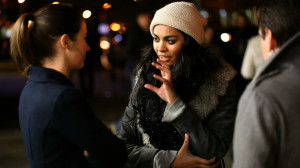
Netflix can be tough to sift through; although it is full of fantastic lesser-known films, there are many terrible films in the library to pad the numbers. Here is a list of five fantastic documentaries, available on Netflix now, that should not be missed.
“Side by Side” (2012)
This fantastic documentary about the advent of digital cinema is not only a must-see crash course on cinema for all film-lovers, but also a fascinating look at the process of technological change: how it happens, when and how people adapt, and how it changes the way things are done. “Side by Side” examines how digital cinema is influencing the way that movies are made at every step of the creative process, from filming to post-production. Keanu Reeves interviews the leaders of the digital revolution, including cinematographer Anthony Dod Mantle and directors David Fincher, Danny Boyle and Steven Soderbergh, as well as the traditionalists who hold celluloid holy, like director Christopher Nolan and his cinematographer, Wally Pfister.
“Gerhard Richter Painting” (2011)
Corinna Belz’s recent documentary “Gerhard Richter Painting” offers a revealing peek into the creative process by following one the greats in contemporary painting, Gerhard Richter, in his studio as he paints. It’s a meditative film–slow by design, but compelling: we watch as Richter adds layer upon layer of paint to the canvas, lets the paintings sit and then edits and changes them–even when you think the piece is done. Richter is not particularly articulate about his work, but it doesn’t matter; it’s about watching the minutiae–the details of his method–that gives insight into how art of any kind gets made.
“49 Up” (2005)
Michael Apted’s “Up” series, of which the most recent, “56 Up,” was just released in cinemas, is a riveting anthropological study in how and whether people really change, and how much of a person’s character, personality and future prospects are cemented early in life. Every seven years, starting with the first film “7 Up,” when the group of British participants from varying socioeconomic backgrounds were all seven years old, a new film is made, and the same group of people who began this experiment when they were children are once again interviewed about their lives and views. You can start with the first film–all are on Netflix–but you still get the idea by starting with the later films, which have more insight and depth and include clips from the previous films.
“Cave of Forgotten Dreams” (2010)
Wernher Herzog’s “Cave of Forgotten Dreams” was one of the first films to make good use of the new 3D technology, taking you into the Chauvet caves in Southern France (where the oldest paintings ever found are) and making you feel like you are actually there. Although the effect is subdued in two dimensions, it is still a wonderful film that gives the world access to historical paintings which are normally closed off to all but a few select scientists. Herzog’s fascination with the eccentric is ever-present in this film too: one of the scientists studying the caves used to be in the circus; he finds a man who searches for caves by sniffing; and the film ends with a perplexing visit to the zoo to see albino alligators.
“Microcosmos” (1996)
Back in the days when few documentaries hit cinemas–and even fewer made it outside the arthouse circuit–“Microcosmos” was made. It’s an utterly gorgeous and compelling documentary about the everyday lives of insects in a meadow in France. “Microcosmos” consists almost entirely of images of the movements and interactions of insects going about their daily lives. Using specialized macroscopic photography techniques, directors Claude Nuridsany and Marie Perennou find beauty in creatures we rarely think twice about by capturing spectacular and enrapturing images: we see the insects going about their daily lives, fighting to the death and mating, all with amazing detail.